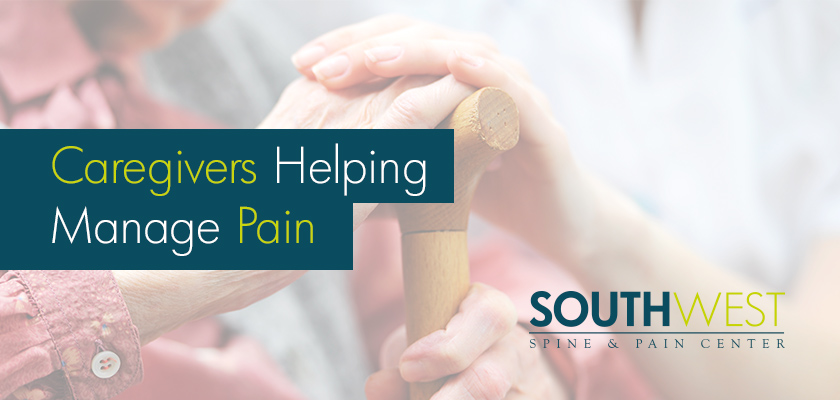
It’s imperative pain patients understand pain doesn’t just affect them, it affects the people around them as well. Family members who have taken on the role as “caregiver” for someone suffering with pain may want to keep a few things in mind before beginning this journey too. Southwest Spine and Pain Center cares about it’s patient’s and the people closest to them, which is why the team of highly qualified physicians is providing tips to help caregivers manage those suffering from chronic pain conditions.
The first “step” to becoming a successful caregiver is to learn about chronic pain and pain management. Pain affects people differently and can develop after a serious medical condition, illness, injury or from absolutely nothing at all. The thing is, chronic pain is widely misunderstood and a very complex condition that requires lots of patience and understanding. Ask your partner or loved one some of the following questions to get a better understanding of their pain:
- “Describe some of your pain symptoms to me. (i.e. stabbing, achy, dull, throbbing, etc.)”
- “When and for how long do you have pain ‘attacks?’”
- “Please rate your pain for me on one or more of the nationally recognized pain assessment scales.” (i.e. Wong-Baker FACES Pain Rating Scale, 0-10 Numeric Pain Rating Scale, etc.)
- “How can I effectively help you manage your pain?”
After you’ve asked these questions, become familiar with some of the treatment options that may be available for pain patients. It may also help to have an open dialogue with your loved one’s SWSP pain management physician. Dr. Derek Frieden, Dr. Jon Obray, Dr. Rick Obray, Dr. Brian Richardson, and Dr. Alan Hillstead have all been fellowship trained in interventional pain management from top-notch facilities like Mayo Clinic, John Hopkins Hospital, Harvard University and Henry Ford Hospital. You can learn more about our physicians and their talented nurse practitioners and physician assistants by visiting the “Providers” section of our website.
The second step? Care for the person in pain AND yourself! For the person with pain, pay attentions to their mood, changes in behavior and their body language. Signs your loved one is in pain may include: irritability, grimacing facial expressions, changes in body movements and walking, loss of appetite, crying, etc. If these signs are present, provide encouragement, take responsibility of the person’s pain medication and be there is a call to the doctors is necessary.
Like we mentioned earlier, it’s equally important you take care of yourself and your needs too. Seeing a loved one suffer can be a painful experience emotionally, but it’s important you remain strong and be there mentally and physically for them. Side aside days for yourself, seek the support of other caregivers and be open to the help of others. Nobody should have to confront chronic pain alone. If you’re feeling frustrated or just want to ask questions about you’re loved ones medical care, call the leaders in Utah pain management. We’re here to help those suffering live the life they desire. Call today!
If chronic pain is impacting your life, don't wait to schedule an appointment at Southwest Spine and Pain Center. With four locations in Utah and growing, the pain management specialists at Southwest Spine and Pain Center are dedicated to helping those who suffer from chronic pain live the life they want to! To schedule an appointment, visit our locations tab!
The advice and information contained in this article is for educational purposes only, and is not intended to replace or counter a physician’s advice or judgment. Please always consult your physician before taking any advice learned here or in any other educational medical material.
©Southwest Spine and Pain Center, 2015
©Medical Marketing Solutions, 2015
